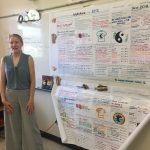Carlene was a student in my Grade 12 English class in 2010. She was a strong student with good marks and intended to go into nursing.
I thought she might make a great nurse as she was amiable, kind and loved working with people.
I was happy for her. She had a plan – unlike many students. While high school graduation rates are high, research suggests that many students feel unprepared for life after high school.
Before she embarked on her post-high school life, we talked in my classroom. I said to her, “If nursing doesn’t work out, you may want to look at some type of writing career.”
“Writing? Why?”
“You are a very skilled writer with a powerful voice,” I told her.
We connected again in 2021. Carlene did not become a nurse, never connecting to the profession as she thought she would. She is a freelance copywriter and urban planning student at Concordia University in Montreal.
She said to me, “Your chat stayed with me. You were the first person who mentioned that my writing could be a viable career option. Without that initial tap on the shoulder, I may not have had the courage to follow my curiosities and passions.”
What is the tap on the shoulder (TOTS)?
The TOTS happens when someone sees something unique, special or curious in another person and directs or alerts them to a previously unknown possibility that could make a difference in their life and career pathing.
The tapper is often a career development practitioner (CDP), but a friend, parent, acquaintance, teacher or employer can be the bearer of a new possibility.
The TOTS has some root in the power of chance – a student in the right place at the right time with the right person connecting with the right information. Sometimes a tap ignites an immediate new focus; other times it may take years of rumination before it is acted upon.
Injecting the TOTS into career development
CDPs can play an integral role in helping students prepare for the tap. When students collect the dots, a phrase identifying the important accumulation of experiences in a life, these coaches offer a discerning eye that recognizes recurring patterns and themes in a student’s life that they may not be able to detect on their own.
Taps have a haphazard quality. Krumboltz’s planned happenstance theory of career development underscores the role of chance in career pathing and in making those off-the-grid, unanticipated decisions that shape a career path.
“CDPs can play an integral role in helping students prepare for the tap.”
A TOTS reminds me what my hockey coach told us to do when we were the first player into a corner: “Keep your head on a swivel.” Coach needed us to be alert, have our eyes open and take note of that player on our back – or, in career development terms, be ready for that unexpected tap. When students keep their heads on a swivel, they make themselves more susceptible to a life-altering TOTS.
When CDPS encourage and guide students to develop networks, choose experiences that connect to them, explore curiosities and build skills in different environments, they help create the key foundation for students to receive a TOTS.
TOTS stories abound
Tap on the shoulder moments are more common than you might think. Here are some diverse examples I’ve encountered during my time as a student, educator and career professional:
- Collège Jeanne Sauvé graduate Jaime had a strong affinity for math in high school, and later completed a university actuarial degree. She had no idea what an actuary was in high school, until a chance conversation with the school librarian, who asked her if she had ever considered becoming an actuary. Tap.
- Grade 11 student Chase explained to me how he had no idea what to do after high school. Our conversation meandered into a special interest he had in working with his dad on cars. I alerted him to the automotive program at the Louis Riel Arts and Technology Centre. He had no idea the program existed. Tap.
- I recently chatted with Tim as we volunteered together at a food depot. He spoke about a difficult childhood in foster care and his time at a youth centre where he recalled a teacher, who lauded his street smarts in interpreting people and their motives. She mentioned that he might take psychology at university. He never forgot her insight. Years later, he majored in psychology at university. Tap.
- A CDP colleague spoke to a client who was down about not being able to find work. A careful study of his experiences revealed an affinity for supply chain work. She introduced him to the Supply Chain Canada designation. He felt purpose and energy. He signed up. Tap.
- Axworthy, my high school English teacher, pulled me aside after a class and asked me to audition for the role of Ali Hakim in her production of Oklahoma. Drama wasn’t my gig, but I got the role and took drama courses at university. Tap.
Can anyone imagine his/her/their personal narrative without a special tap or two on the shoulder somewhere along the life journey? Sometimes they ignite a huge life change; other times they spark a new way of thinking or simply turn an eye toward a piece of information.
The TOTS can be a game-changer
A tap from a teacher, parent or friend can ignite confidence or unintended focus, adding a degree of clarification, validation or possibility. It can set a student on a path where there may have been none, confirm a possibility that was hazy or alert a person to a career cluster that wasn’t on the radar.
All students benefit from structured learning environments, but it’s also up to CDPs and schools to foster those serendipitous moments when new insight and opportunity coalesce and point to different possibilities – some useful in the immediate moment, others stored away for a later time.
A tap on the shoulder just might be the most important career guidance anyone can receive.






